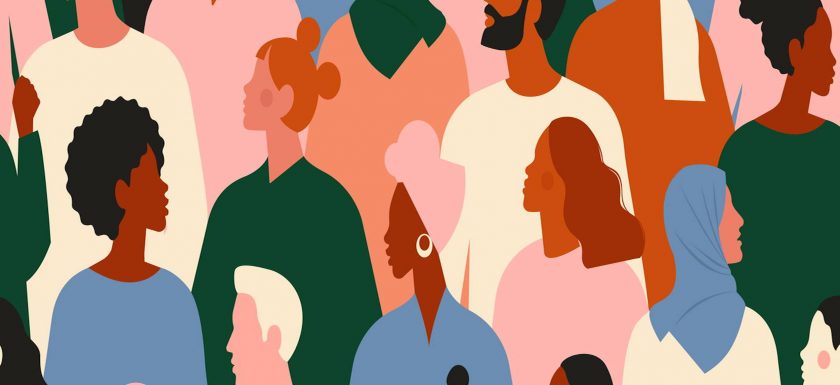
Diversity is a very hot topic at the moment. All over we see campaigns about it, companies waking up to its profit potential, and institutions wanting to harness its creative power. What do we mean when we use the word diversity, what is its scope? Who do we want to reach and who feels spoken to when we say that diversity matters?
Unique people living together
Simply put, diversity is the existence of a wide variation of characteristics in a group of people. When we say diversity matters, we are recognizing and valuing that variation, and aiming at promoting fair treatment and full participation of all people – particularly those underrepresented or subjected to discrimination.
The diversity actions we take should work towards nurturing a sense of belonging – embracing and speaking to everyone, making sure that we are all heard and seen in our uniqueness. For we all are the curated result of our upbringing, our genes, our background, our surroundings, our choices. Some of these we can control, work on to achieve certain traits, to harness and perfect specific skills; some are imposed upon us by genetics, by society, by circumstance. Some of these bring us forward, give us a too often invisible push ahead; some keep us back. But us being unique carries value.
Diversity and Science
Let us take science as an example: we learn that science is objective, the systematic pursuit of knowledge. We know that the answers to the big mysteries that puzzle us are independent from our uniqueness. They are concrete outcomes of well-designed experiments, neutral, consistent. But the questions we pose and how we go about seeking objective answers to those questions are results of our prior knowledge and experience. What a scientist does is unavoidably informed by who they are as a one-of-a-kind person and how they interact with other one-of-a-kind people trying to solve the same riddle. Our being different, our being unique, makes for better science. It enriches scientific pursuit and brings us closer to grasping the wonder of the world; it makes us collectively more creative and innovative; it drives us further.
Discrimination and Privilege
Our uniqueness also carries power. The dynamics of diversity are complex, and its different dimensions mean that we are at times victims of discrimination whereas at other times we are the ones discriminating towards others. It is crucial that we recognize not only those circumstances in which being unique works against us, but also those when it works for us. We must dare to reach deep inside ourselves and acknowledge our inherited privilege. Identifying and reflecting on how we benefit from our circumstance will allow us to be agents of change.
Only then can we help bring forward those in less privileged or even outright marginalised groups, help them join their voice. We can do this by public shows of support, by promoting equity as a means to achieve equality, by fighting to give everyone space to thrive and fully explore and blossom, to do their very best. It is not an easy process as we will be pushing against artificial historic and systemic barriers, made to keep out instead of bringing in, as well as be forced to acknowledge and be accountable for our (often unconscious) role in perpetuating them. In the end, we will all be better for it.
Written by Ana Anselmo – HZB Diversity officer.
This blogpost is part of a series on Diversity. You can find further articles here.
